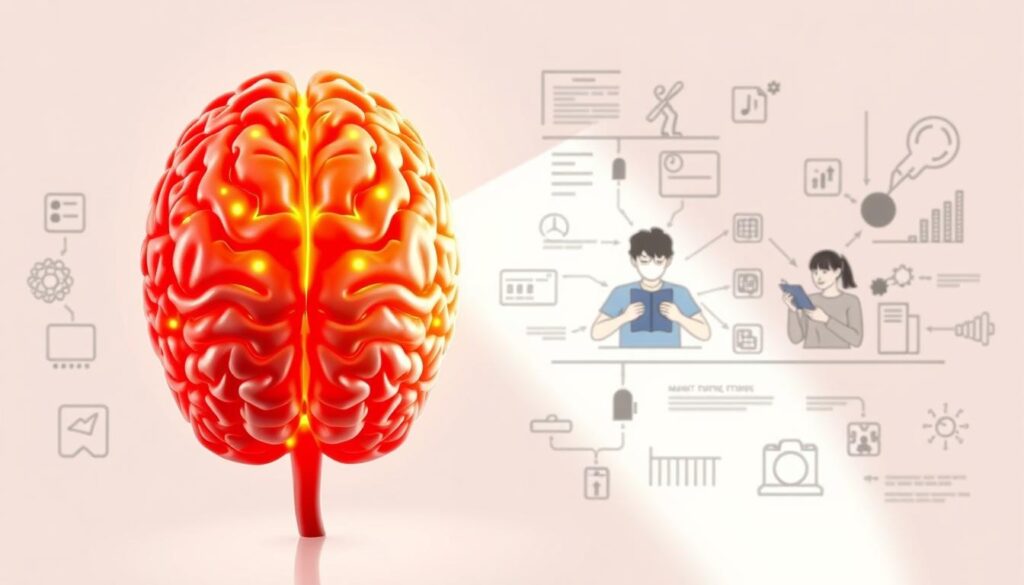Did you know regular brain exercises can cut dementia risk by 30%? This fact shows how important these activities are for your mind. As people look for ways to better their mental skills and avoid brain decline, learning about brain exercises is key.
Brain exercises help everyone, from kids to older adults. You can boost your brain with things like puzzles, being mindful, or even moving more. Adding different kinds to your day makes your brain stronger and sharper.
Key Takeaways
- Engaging in regular brain exercises can decrease dementia risk by up to 30%.
- Cognitive enhancement through exercises benefits all age groups from children to seniors.
- Utilizing a mix of physical, mental, and mindfulness activities can improve mental abilities.
- Even simple activities like puzzles and meditation can significantly improve cognitive skills.
- Implementing these exercises in daily life contributes to overall brain health.
Understanding Cognitive Function
To get our brains working better, we need to know about brain skills first. These skills include remembering, paying attention, solving problems, and using language. They help us with everyday life and feeling good.
What is Cognitive Function?
Cognitive function is how our brain processes information. It involves things like seeing, learning, and thinking. Making these brain skills stronger can make us smarter. We do this by doing activities that challenge our minds.
Importance of Cognitive Health
Keeping our brain healthy is key to living well and on our own. A smart brain helps us make better choices, solve problems, and handle our feelings. Doing brain exercises can help us keep our minds sharp longer. This makes life better.
Factors Affecting Cognitive Function
Several things can impact how well our brains work:
- Genetics: We can’t change our genes, but knowing about them can help us find the best brain activities.
- Lifestyle Choices: Being active, eating well, and getting enough sleep all help keep our brains healthy.
- Education and Mental Engagement: Learning new things and challenging our brains make them stronger.
- Environment: Being around people and doing brain activities in a fun place is good for our brain health.
Adding brain exercises to our daily life is a great way to keep our brains strong and sharp.
The Science Behind Brain-Boosting Exercises
Recent studies are showing us a clear picture. Brain exercises can really sharpen our minds. They work on our brain in many ways. This makes us think faster and keeps our brains healthy.

How Exercise Affects the Brain
When we move, our brain gets more blood, full of nutrients and oxygen. This keeps and makes our brain work better. Harvard Medical School research tells us even a little exercise can do big things for our brain. It helps especially with memory and learning.
Exercise also helps our brain to grow new cells. It makes our brain more flexible. This means we can solve problems better and think more clearly.
Neuroplasticity and Cognitive Enhancement
Neuroplasticity is about our brain making new connections. It’s key to making our thinking better. Exercises like puzzles or playing certain games strengthen this. They push our brain and grow new connections. This helps us stay sharp as we grow older.
Keeping our brain fit is like giving it a regular workout. This makes our brain ready for new challenges. It helps us keep a strong memory and thinking skills at any age.
| Brain-Boosting Exercise | Main Cognitive Benefits |
|---|---|
| Aerobic Exercise | Improved memory, increased blood flow, and enhanced learning ability |
| Puzzles and Strategy Games | Boosts neuroplasticity, enhances problem-solving skills, and sharpens mental agility |
| Cognitive Training Activities | Encourages new synapse growth and maintains cognitive performance |
Types of Brain-Boosting Exercises
Doing different exercises is good for your brain. Mixing physical, mental, and healthy eating habits helps a lot. Let’s look at the important kinds:
Physical Exercises for Brain Health
Aerobic exercises help make new brain cells. Try running, swimming, or fast walking. They make your memory and attention better.
Mental Exercises and Puzzles
Brain puzzles keep your mind sharp. Try Sudoku, crosswords, or strategy games. They help with solving problems and thinking deeply.
Mindfulness and Meditation Techniques
Adding mindfulness and meditation to your day is great for your brain. Things like deep breathing, yoga, and guided meditation improve your focus, lower stress, and control emotions. This is good for your brain’s health.
Nutrition and Cognitive Function
Eating well helps your brain too. Foods high in omega-3 fats, antioxidants, and vitamins are key. Eating fish, berries, and green veggies are good choices for your brain.
Creating a Balanced Routine
Starting to improve your mind takes a good plan. It’s about doing different activities that make your brain stronger. Let’s look at how to begin and keep going.
Setting Realistic Goals
It’s important to set goals that you can reach. Think about what you want to get better at. It could be your memory or how well you solve problems. Write these goals down. Then, break them into smaller steps so it’s not too much at once.
Combining Different Types of Exercises
Using all kinds of exercises is key for a better brain. For example, mix running with puzzles and time to meditate. This all-around plan really helps your brain grow stronger as time goes on.
Measuring Your Progress
Keeping an eye on your progress keeps you going. You can use a journal, apps, or charts to see how you’re doing. Checking your progress often helps you change your plan to make your brain even better.
| Type of Exercise | Frequency | Progress Indicators |
|---|---|---|
| Aerobic Exercise | 3-4 times a week | Stamina, Mood Improvement |
| Mental Puzzles | Daily | Increased Problem-Solving Skills |
| Mindfulness Meditation | Daily | Enhanced Focus and Calmness |
Brain-Boosting Exercises for Different Age Groups
It’s key to know how to up brain power for all ages. Whether it’s for kids, adults, or the elderly, pick right activities. These should match each group’s growth stage.

Exercises for Children
Kids’ brains grow fast and need the right push. Games that make them think, remember, and solve problems are good. Puzzles, memory games, and learning apps can help a lot.
Cognitive Exercises for Adults
Adults can stay sharp with mental and lifestyle choices. Reading, new skills, and games like chess are good. Don’t forget physical activity, eating right, and sleeping well.
Keeping Seniors Mentally Sharp
Older adults face challenges in keeping their mind crisp. It helps to do things that keep the brain limber and boost memory. Sudoku, crosswords, and hanging out with friends are key.
Also, staying active and eating well matters. It keeps their mental health better for longer.
Incorporating Technology in Cognitive Training
As tech gets better, we find new ways to make our brains stronger. Now, there are digital tools for brain exercises. They help us get better at remembering, solving problems, and thinking.
Brain Training Apps
Brain training apps are an easy way to work out your brain. Apps like Lumosity, Elevate, and Peak have been made for this. They have games and activities to improve memory, focus, and quick thinking.
Online Games for Cognitive Improvement
Online games are also great for making your brain better. Sites like Brain Games and CogniFit have fun, educational games. These games focus on solving problems, thinking fast, and staying cool under pressure.
| Platform | Types of Cognitive Exercises | Features |
|---|---|---|
| Lumosity | Memory, attention, flexibility | Personalized training programs, performance tracking |
| Elevate | Speaking, processing speed, reading | Daily workouts, adaptive difficulty |
| Brain Games | Puzzles, logic, math | Social competitions, daily challenges |
| CogniFit | Problem-solving, coordination, memory | Scientifically validated, progress analytics |
Common Misconceptions About Cognitive Function
Many people have wrong ideas about cognitive function and brain health. It’s important to correct these beliefs. Doing so helps us see how mental exercises really help our minds.
Debunking Myths
A big myth is that losing brain power is a must as we get older. True, our minds change with age. But, studies show that brain exercises can keep us sharp longer.
Some think only hard, complex tasks boost brain power. But easy, everyday activities also make a big difference in keeping our brains healthy.
Understanding Realistic Outcomes
Knowing what to expect from brain exercises is key. They improve memory, solve problems better, and make our minds quicker. But, it won’t make us geniuses right away. Progress is slow and takes regular effort.
Let’s look at what’s really possible versus the myths:
| Common Myths | Realistic Outcomes |
|---|---|
| Significant cognitive decline is inevitable with age. | Cognitive function can be maintained or even improved with regular exercises. |
| Only intense brain training sessions are effective. | Simple, daily activities can enhance brain performance. |
| Cognitive exercises yield immediate results. | Benefits are gradual and require consistent practice. |
Knowing these true outcomes helps us value brain exercises more. It encourages us to keep at it for better brain health.
Tips for Maintaining Consistency
It can be tough to keep up with brain exercises. But, follow these tips to stay on course. Making them a daily habit is key for your brain’s health. Let’s explore how to weave them into our daily lives.
Building a Daily Habit
To get your brain in shape, make the exercises a regular thing. Pick times like before breakfast or lunch breaks to do them. Start with easy goals to smoothly add these exercises into your schedule. This way, you won’t get stressed and your brain will get stronger.
Staying Motivated
Keeping up your spirit is super important for better brain power. Note down how much you improve to see your progress. Cheering for every small win keeps you going and shows why these exercises matter. Also, being part of a group or online forum for support and tips is really helpful.
Overcoming Barriers
Beating challenges is a must to keep going. Things like no time, getting bored, and too many distractions can stop you. Try mixing up your exercises to make them fun and interesting. Also, plan your day to fit these exercises in. Keep distractions away when exercising to focus better.
Conclusion
We have learned a lot about brain exercises. These activities are good for your mind and health. They make your mind sharp and help fight old age brain problems.
Doing brain exercises often can make your mind stronger and sharper. This helps you stay smart all your life.
The Long-Term Benefits of Brain-Boosting Exercises
Doing brain exercises can change your brain for the better. This change is good for remembering, solving problems, and managing feelings. If you keep at it, you’ll feel happier, less stressed, and more satisfied with life.
Being smart about your brain health can make work and daily tasks easier. This means life’s challenges don’t feel so tough.
Encouragement for Continued Practice
It’s key to keep up with the brain exercises to see the best results. Set goals you can reach and keep your spirits up, even if it feels slow. Think of improving your mind as a long journey, not a quick race.
By doing these exercises every day, you’re making a good habit for life. This helps keep your mind at its best. Let’s enjoy the little victories, knowing they lead to a smarter and happier you.